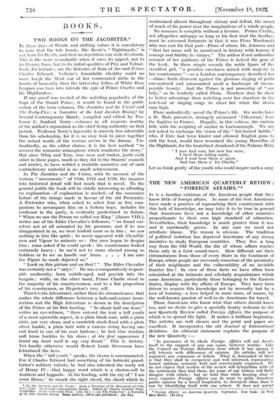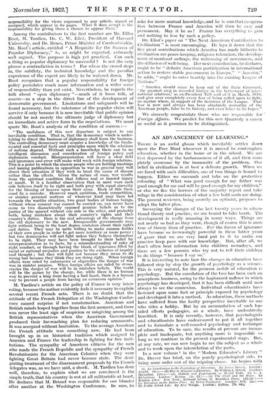THE NEW AMERICAN QUARTERLY REVIEW "FOREIGN AFFAIRS."*
IT is a familiar criticism of the American people that they know little of foreign affairs. As some of the best Americans have made a practice of reproaching their countrymen with this lack of knowledge, we may take it to be true in general that Americans have not a knowledge of other countries proportionate to their own high standard of education.
Nevertheless, their knowledge is much greater than it was and it continually grows. In any case we need not attribute blame. The reason is obvious. The tradition of political isolation has deprived Americans of any strong incentive to study European countries. They live a long way from the Old World, the din of whose affairs reaches them only in a faint sound-wave. How different are their circumstances from those of every State in the Continent of Europe, where people are nervously conscious of the proximity of their neighbours and the vulnerability of an invisible frontier line ! In view of these facts we have often been astonished at the intimate and scholarly acquaintance which some Americans, particularly those belonging to the Eastern States, display with the affairs of Europe. They have been driven to acquire this knowledge not by necessity but by a love of learning—a love helped in some cases, of course, by the well-known passion of well-to-do Americans for travel. Those Americans who know wish that others should know too, and we desire to give a specially hearty welcome to the new Quarterly Review called Foreign Affairs, the purpose of which is. to spread the light. It makes a brilliant beginning.
The articles are well chosen and the print and paper are excellent. It incorporates the old Journal of International Relations. An editorial statement explains the purpose of the new Quarterly :-
" In pursuance of its ideals Foreign Affairs will not devote itself to the support of any one cause, however worthy. Like the Council on Foreign Relations from which it has sprung it will tolerate wide differences of opinion. Its articles will not represent any consensus of beliefs. What is demanded of them is that they shall be competent and well informed, representing honest opinions seriously held and convincingly expressed. We do not expect that readers of the review will sympathize with all the sentiments they find there, for some of our writers will flatly disagree with others ; but we hold that while keeping clear of mere vagaries Foreign Affairs can do more to guide American public opinion by a broad hospitality to divergent ideas than it can by identifying itself with one school. It does not accept • Foreign Affairs: an American Quarterly. September. Hew York : 25 West 43rd Street. 141.25c.j
responsibility for the views expressed in any article, signed or Unsigned, which appear in its pages. What it does accept is the responsibility for giving them a chance to appear there."
Among the contributors to the first number are Mr. Elihu Root, M. Tardieu, Dr. C. W. Eliot, President of Harvard University, and Dr. Benes, Prime Minister of Czechoslovakia. Mr. Root's article, entitled " A Requisite for the Success of Popular Diplomacy," is, as might be expected, extremely well argued. The purpose is high yet practical. Can such a thing as popular diplomacy be successful ? Is not the very phrase a contradiction in terms ? For where the crowd steps in, the subtlety, the technical knowledge and the peculiar experience of the expert are likely to be watered down. Mr. Root recognizes that a popular responsibility for foreign policy postulates much more information and a wider sense of responsibility than yet exist. Nevertheless, he regards the talk about " open diplomacy "—much of it loose talk, of course—as a step in the direct line of the development of democratic government. Limitations and safeguards will be found necessary, but the substance of the popular claim will survive if only because it is now inevitable that public opinion should be not merely the ultimate judge of diplomacy but an immediate and active force in the negotiations. We must quote Mr. Root's analysis of the condition of success :- " The usefulness of this new departure is subject to one inevitable condition. That is, that the democracy which is under- taking to direct the business of diplomacy shall learn the business. The controlling democracy must acquire a knowledge of the funda- mental and essential facts and principles upon which the relations of nations depend. Without such a knowledge there can be no intelligent discussion and consideration of foreign policy and diplomatic conduct. Misrepresentation will have a clear field and ignorance and error will make wild work with foreign relations. This is a point to which the sincere people who are holding meetings and issuing publications in opposition to war in general may well direct their attention if they wish to treat the cause of disease rather than the effects. Given the nature of man, war results from the spiritual condition that follows real or fancied injury or insult. It is a familiar observation that in most wars each side believes itself to be right and both pray with equal sincerity for the blessing of heaven upon their arms. Back of this there must lie a mistake. However much ambition, trade competition, or sinister personal motives of whatever kind may have led towards the warlike situation, two great bodies of human beings, without whose consent war cannot be carried on, can never have come to two diametrically opposed genuine beliefs as to the justice of the quarrel without one side or the other, and probably both, . being mistaken about their country's rights and their country's duties. Here is the real advantage of the change from the old diplomacy to the new. Irresponsible governments may fight without being in the least degree mistaken about their rights and duties. They may be quite willing to make cannon fodder of their own people in order to get more territory or more power ; but two democracies will not fight unless they believe themselves to be right. They may have been brought to their belief by misrepresentation as to facts, by a misunderstanding of rules of right conduct, or through having the blank of ignorance filled by racial or national prejudice and passion to the exclusion of inquiry an& thought ; but they will fight not because they mean to do wrong but because they think they are doing right. When foreign affairs were ruled by autocracies or oligarchies the danger of war was in sinister purpose. When foreign affairs are ruled by demo- cracies the danger of war will be in mistaken beliefs. The world will be the gainer by the change, for, while there is no human way to prevent a king from having a bad heart, there is a human way to prevent a people from having an erroneous opinion."
M. Tardieu's article on the policy of France is very inter- esting, because the author evidently feels it necessary to explain several recent French acts. There is no doubt that the attitude of the French Delegation at the Washington Confer- ence caused surprise if not consternation. American and British minds leaped together from the first moment, and there was never the least sign of suspicion or misgiving among the British representatives when the American Government produced their far-reaching plan for reducing armaments. It was accepted without hesitation. To the average American the French attitude was something new. He had been brought up in an historical tradition which assigned to America and France the leadership in fighting for free insti- tutions. The sympathy of American citizens for the men who made the French Republic and the sympathy of French Revolutionists for the American Colonies when they were fighting Great Britain had never become stale. The deni- grating treatment of the disarmament proposals by the French delegates was, as we have said, a shock. M. Tardieu has done well, therefore, to explain what we are convinced is the simple truth, that his country is not at all militaristic at heart, He declares that M. Briand was responsible for one blunder after another at the Washington Conference. In sum, he asks for more mutual knowledge, and he is sure that co-opera- tion between France and America will then be easy and permanent. May it be so France has everything to gain and nothing to lose by such a policy.
Dr. Eliot's paper on " The Next American Contribution to Civilization " is most encouraging. He lays it down that the five great contributions which America has made hitherto to civilization are peace-keeping, religious toleration, the develop- ment of manhood suffrage, the welcoming of newcomers, and the diffusion of well-being. Her next contribution, he declares, ought to be " definite American participation in international action to restore stable government in Europe." America," he adds, " ought to enter heartily into the existing League of Nations."
" America should cease to keep out of the Paris Covenant, the greatest step in recorded history in the betterment of inter- national relations,' as ex-President Taft said of it in March, 1919, and give over completely every fear of being called upon to tight, no matter where, in support of the decisions of the League. That fear is now and always has been absolutely unworthy of the American people, false to its history, and even falser to its hopes."
We sincerely congratulate those who arc responsible for Foreign Affairs. We predict for this new Quarterly a career as useful as it promises to be distinguished.







































 Previous page
Previous page